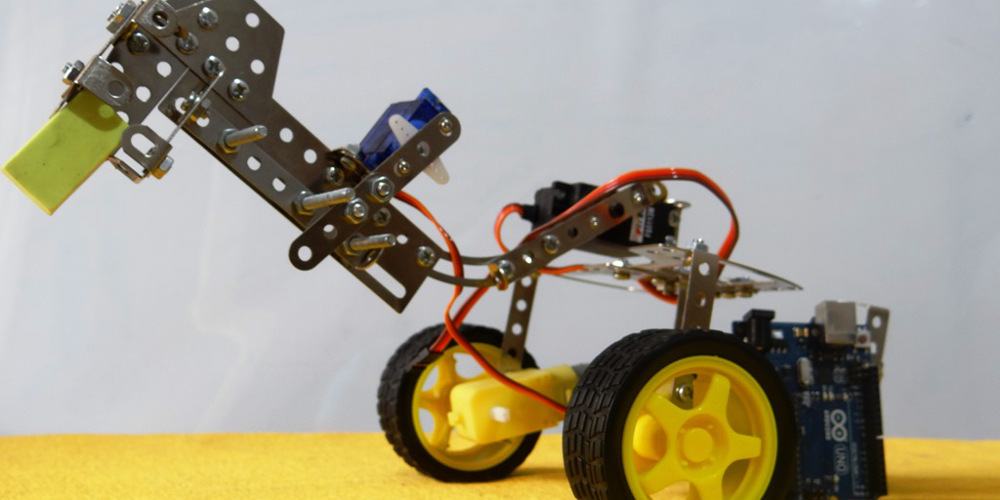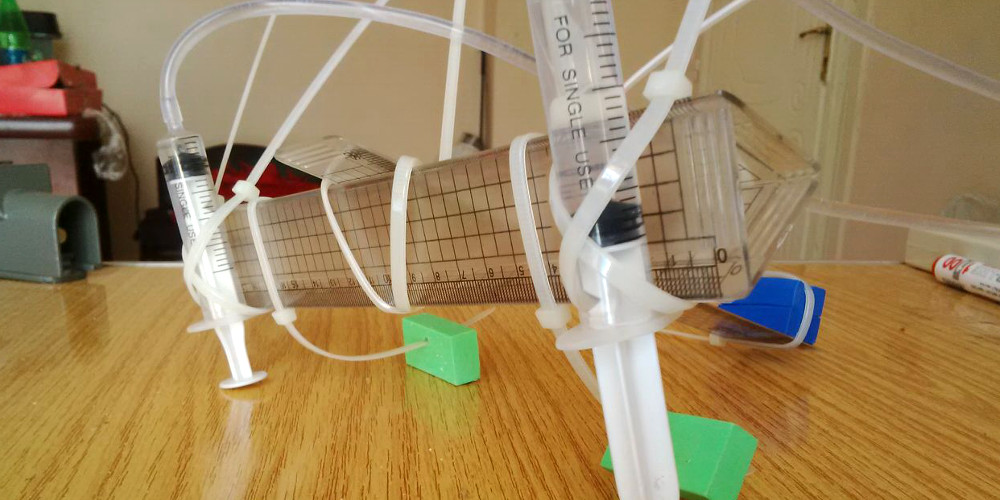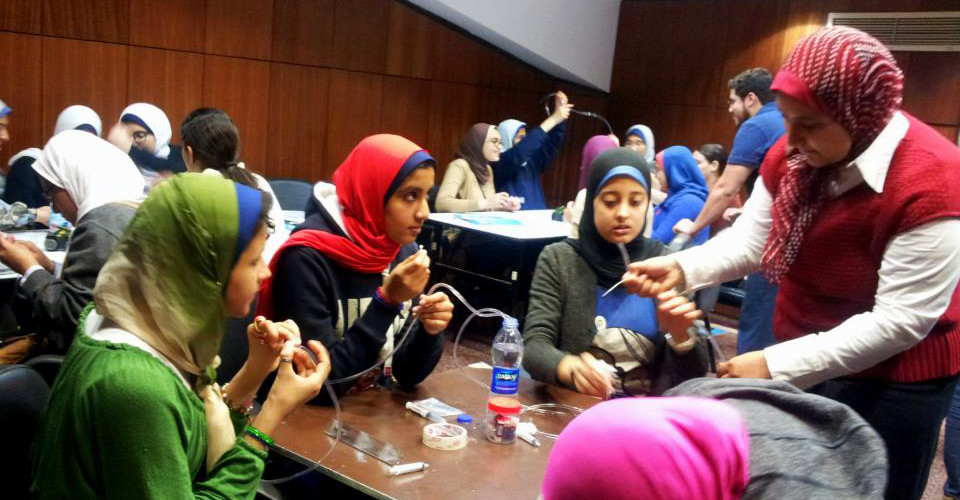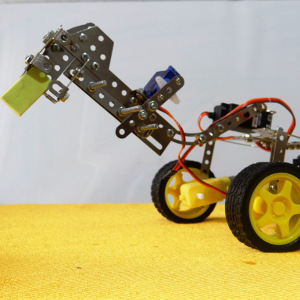
CORD stands for „Competition of Robot Design“ and also with a competition started the history of CORD. From the fascination to robots Mohammed A. ElRaffie established the business of science communication, where edutainment offerings provide experience in the construction of robots. In less than an hour, event participants are acquainted with new dimensions of applied physics. Using widely available materials, they build the world’s simplest robots.
During ITU Telecom World 2014 Mohammed offered such workshops within the framework of “The Lab” – a cooperation between ITU Telecom World and Ars Electronica. CORD invited participants to go on a journey through the realm of innovation. Following an introduction by the workshop leader, crew members used their objects—things that initially seem unsuitable—to develop a simple mechanism. The participants experienced for the first time how inspiring their everyday surrounding can be and how simple it is to use commonplace stuff as components to build something new.
Before Mohammed travelled to Doha we met him and talked to him about his work with CORD.
Mohammed, what’s your background and how did you come up with the idea of CORD?
Mohammed A. ElRaffie: I’m a mechanical engineer with a passion for science and a belief that science helps expand one’s ability to notice one’s surroundings and make better decisions in life. Ever since I was in primary school, I’ve looked for ways to show off my “skills” to build things out of broken toys and discarded materials, trying to make a point that I was a geek. As I got older and went to engineering schools, I was astonished to find that there was still no encouragement or support for learning to build things practically—official or not—especially in mechanics, since the trial-and-error process is very costly.
My first complete project back in preparatory school was a very simple robot to perform chemical reactions with no electronics and with the simplest of materials, and so I thought of robots. It was the thing I did before, and what I knew about. Together with a friend, I launched a new student activity that organizes an annual contest for simple robots, and we had that rule that engineering is about efficiency, and whoever pays the least while still able to achieve the task wins. The idea grew larger and students became interested in an inexpensive solution for practical learning, and because we were using simple, basic physics, people with non-technical backgrounds started to join in as well. And this is how it all started.
What does the name CORD (Competition of Robot Design) mean?
Mohammed A. ElRaffie: The name was an indication of what we used to do mainly when we first started – organizing contests on many campuses around Egypt for anyone interested in learning about building robots. We combined the competitions with open sessions to help the participants get a feel for what they’re about to build and to raise their motivation. Now we call it the innovative CORD—getting people ready to generate strands of creativity and letting everyone climb the innovation rope and discover what they’re really capable of.
 So, you believe that integrating scientific knowledge into our daily lives can raise our productivity and creativity. But how can scientific knowledge be integrated into our daily lives?
So, you believe that integrating scientific knowledge into our daily lives can raise our productivity and creativity. But how can scientific knowledge be integrated into our daily lives?
Mohammed A. ElRaffie: Two main, simple ways: The first is to integrate science into our daily decisions – especially the fact that we’re literally surrounded by machines that we interact with, and their performance and durability changes dramatically if handled with knowledge. The second thing we can do is using our hands more. We live in an age of digitization, getting further separated from nature and physical sense every day. We and our children should be encouraged to try and discover the power and sophistication of our hands, the most accurate and amazing mechanical devices connected to the world’s most sophisticated computer: our brain. Try building your own desk, or at least a chair or a lamp in your home. It’s not only art but also science. Engineering is the art of applying physics.
What does CORD exactly do and what is your vision?
Mohammed A. ElRaffie: CORD now produces advertising robots that are used as a hands-on case study for technical students during their summer internships with a benefit for the private sector looking for unique advertizing solutions. Also, with robot building kits, mechanical interactive games, robot contests and practical construction training simplified for kids, we aim to provide a new “friendly science.” We want to integrate scientific knowledge into our daily lives to raise our productivity and creativity through edutainment products and activities.
 Who is the target group of CORD?
Who is the target group of CORD?
Mohammed A. ElRaffie: CORD works with a very wide range of beneficiaries because we do science communication. We try to always provide what could be generally considered interesting. However, we have a department dedicated to research on providing training for ages 4 to 16 through building kits designed in the CORD Lab. This program is entitled Science Crafts. Currently this is our main target group. We are also working with young people and university students to provide them with interactive workshops, kits and programs, but we are still at the beginning of that phase. We are also working now on approaching advertizing agencies and establishing connections with private and international businesses interested in buying, sponsoring or ordering customized models of our new advertizing robots.
Where is CORD already active? Where shoukd it be active in the future?
Mohammed A. ElRaffie: Currently CORD is working in Egypt. We recently visited Tunisia, and we’re looking forward to expanding there and eventually around the Arabian world, since this is our main targeted area for maximum social impact. However, CORD activities are very generic and we’ve had a couple of trials with participants outside the Arabian region and they were equally interested. So, if we’re talking future, we’re talking global.

Why did you decide to respond to the call from ITU Telecom World 14 and Ars Electronica?
Mohammed A. ElRaffie: It seemed like the right exposure opportunity at the right time. CORD now is gaining confidence by the second in what we’re offering and the benefits it can bring to our customers; however, we’re in serious need of feedback and diversity. Both feedback and confidence can help us get in the market faster and start doing beneficial social business.
What do you show at “The Lab” in Doha?
Mohammed A. ElRaffie: I’m going to be offering a workshop that shows how we can build simple dynamic objects—robots, so to speak – from simple desktop surroundings in less than an hour. The workshop is going to be presented four times a day, every day of the conference. It’s a hands-on activity in which the participants are going to build the robot and see it move. We won’t handle any electronics, just classic, simple physics doing its magic.
What are your expectations from “The Lab“?
Mohammed A. ElRaffie: Feedback. Every time we did that workshop “with a wide variety of attendees’ backgrounds and ages,” the workshop was very entertaining and engaging. One specific comment from an adult participant was that we were very present, regardless of distractions. So, I expect that participants will experience science in a way that is a very different than what they usually encountered in school. And I also believe that this could be very interesting international exposure for CORD, which I hope will result in effective expansion.
Find more information about “The Lab” and detailed project descriptions:
http://export.aec.at/itu2014/en
Find more pictures:
